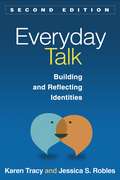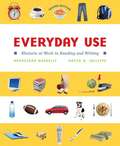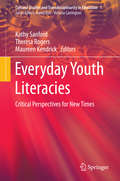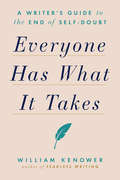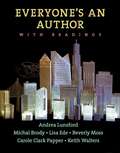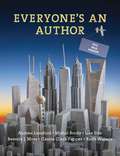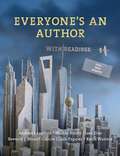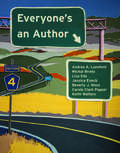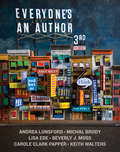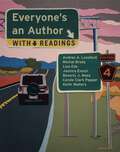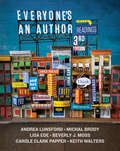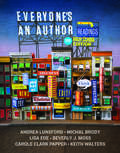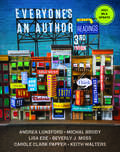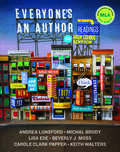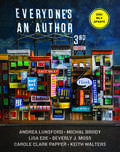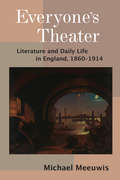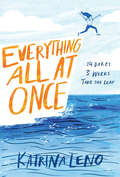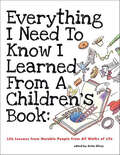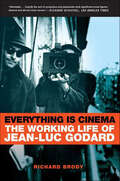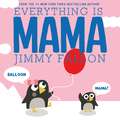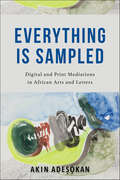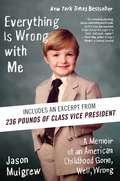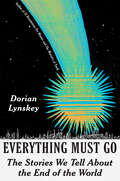- Table View
- List View
Everyday Spelling D'Nealian Edition
by James Beers Ronald L. Cramer W. Dorsey HammondNIMAC-sourced textbook
Everyday Talk, Second Edition
by Karen Tracy Jessica S. RoblesThis engaging text explores how everyday talk--the ordinary kinds of communicating that people do in schools, workplaces, and among family and friends--expresses who we are and who we want to be. The authors interweave rhetorical and cultural perspectives on the "little stuff" of conversation: what we say and how we say it, the terms used to refer to others, the content and style of stories we tell, and more. Numerous detailed examples show how talk is the vehicle through which people build relationships. Students gain skills for thinking more deeply about their own and others' communicative practices, and for understanding and managing interactional difficulties. New to This Edition *Updated throughout to incorporate the latest discourse analysis research. *Chapter on six specific speech genres (for example, organizational meetings and personal conversation). *Two extended case studies with transcripts and discussion questions. *Coverage of digital communication, texting, and social media. *Additional cross-cultural examples. Pedagogical Features Include: *A preview and summary in every chapter. *Accessible explanations of core concepts. *End-of-book glossary. *Endnotes that identify key authors and suggest further reading.
Everyday Use: Rhetoric at Work in Reading and Writing (2nd Edition)
by David A. Jolliffe Hephzibah RoskellyBrief and accessible, this rhetoric teaches students to read closely, critically, and rhetorically, and to write effectively to achieve their rhetorical goals. Everyday Use answers the basic question, "What is rhetoric?" It shows rhetoric as set of activities-reading, writing, speaking, listening-that all intellectually engaged people participate in every day. And it shows that a knowledge of rhetoric is essential in understanding how written and spoken texts influence thought and action every day, in private and in public forums, for good or ill. By demystifying rhetoric and rescuing it from common public misconceptions,Everyday Use equips students to be effective communicators in the academic world and in everyday life.
Everyday Use: Rhetoric at Work in Reading and Writing (AP Edition)
by David A. Jolliffe Hephzibah RoskellyEveryday Use: Rhetoric at Work in Reading and Writing is designed specifically for use in Advanced Placement English courses that try to achieve these goals. In six chapters and a series of interchapters, this book provides a foundation for reading insightfully and writing effectively and strives to teach students how to produce their own texts that are rich, purposeful, and effectively crafted.
Everyday Youth Literacies
by Kathy Sanford Theresa Rogers Maureen KendrickTestifying to the maturity of the youth literacy education field, this collection of papers displays the increasing sophistication of research on the subject, and at the same time offers pointers to its potential for development in the next decade. The contributors track the rapid proliferation of youth literacies in today's digital age, from video games to social media and film production. Drawing on detailed research and an intimate knowledge of youth communities in nations as diverse as Canada and Uganda, they provide notable examples of digital literacies in situ, and challenge conventional wisdom about literacy education. The chapters do more, however, than merely offer reportage of a crisis in literacy education. The authors embrace the core challenge faced by educators everywhere: how to incorporate and utilize new modes of literacy in education, and how to realize the potential benefits of heterogeneous modern media in youth literacy education, especially in marginalized, remote, and disadvantaged communities. This volume expands our view of digital communications technologies and digital literacies to include complex understandings of how media such as translated videos can serve as learning tools for youths whose access to literacy education is limited. In particular, a number of contributing scholars provide important new information about the praxis of teachers and the literacies adopted by young people in Africa, a continent largely neglected by literacy researchers. This book's global perspective, and its ground-level viewpoint of youth literacy practices in a variety of locations, problematizes normative assumptions about researching literacy as well as about literacy itself.
Everyone Has What It Takes: A Writer's Guide to the End of Self-Doubt
by William KenowerAn insightful guide for any writer who's ever wondered if they're talented, creative, lovable, or worthy enough. Spoiler alert: You are.As hard as the craft of writing is, the greatest challenges writers face are often within ourselves. Comparison, self-doubt, isolation, and other internal struggles can derail a writer's progress, at any stage in the writing life. Author, essayist, and speaker William Kenower knows these struggles first-hand, and hears them from writers everywhere he teaches and appears. In this candid and encouraging book, he dismantles the myth that some writers have talent and others don't, and shares relatable stories, wisdom, and best practices for reengaging with our passion, following our curiosity, and staying connected to what matters most. If you've ever wondered whether you're "really" a writer, or should retreat to a safer, more conventional path, this enlightening and accepting book will spark renewed purpose and joy on your writing journey.
Everyone's An Author (With Readings)
by Lisa Ede Andrea A. Lunsford Keith Walters Beverly J. Moss Michal Brody Carole Clark PapperEveryone's an Author focuses on writing as it really is today--with words, images, and sounds, in print and online--and encourages students to see the connections between their everyday writing and academic writing. It covers the genres college students need to learn to write--and teaches them to do so across media. It bridges the gap between Facebook and academic writing, showing how the strategies students use instinctively in social media can inform their academic writing. And it provides a strong rhetorical framework that guides students in the decisions they need to make as authors today. The version with readings includes an anthology of 35 readings.
Everyone's An Author, Second Edition
by Lisa Ede Keith Walters Beverly J. Moss Michal Brody Carole Clark Papper Andrea LunsfordEveryone’s an Author focuses on writing as it really is today―with words, images, and sounds, in print and online―and encourages students to see the connections between their everyday writing and academic writing. It covers the genres college students need to learn to write―and teaches them to do so across media. It bridges the gap between Facebook and academic writing, showing how the strategies students use instinctively in social media can inform their academic writing. And it provides a strong rhetorical framework that guides students in the decisions they need to make as authors today.
Everyone's An Author: With Readings
by Lisa Ede Keith Walters Michal Brody Carole Clark Papper Andrea Lunsford Beverly MossBuilt on the keystones of rhetoric, Everyone’s an Author provides a strong foundation for authoring in the digital age: in college essays, but also on Twitter; in print, but also online; with words, but also with sound, video, and images. It shows students that the rhetorical skills they already use in social media, in their home and religious communities, at work and in other nonacademic contexts are the same ones they’ll need to succeed in college. Examples and readings drawn from across multiple media and dealing with topics that matter to students today make this a book that everyone who takes first-year writing will relate to.
Everyone's an Author (Fourth Edition)
by Lisa Ede Keith Walters Beverly J. Moss Michal Brody Carole Clark Papper Andrea Lunsford Jessica EnochThe “can-do” writing guide that helps students harness the power of rhetoric Everyone’s an Author builds confidence by showing students they already know how to make good rhetorical choices in their daily lives and by offering writing advice for growing those skills as students, professionals, and citizens. By understanding rhetoric, students bridge the gap between the writing they already do—online, at home, in their communities—and the writing they’ll do in college and beyond. And it’s a book for all students, providing examples, readings, and advice that everyone will see themselves in. The Fourth Edition extends the book’s inclusive, rhetoric-focused message with new chapters on reflection; language, power, and rhetoric; and writing for a public audience—and a new suite of teaching tools that inspire and empower instructors as well. This purchase offers access to the digital ebook only.
Everyone's an Author (Third Edition)
by Lisa Ede Keith Walters Michal Brody Carole Clark Papper Andrea Lunsford Beverly MossHelp students realize their power as authors Students today are writing more than ever. Everyone’s an Author bridges the gap between the writing students already do—online, at home, in their communities—and the writing they’ll do in college and beyond. It builds student confidence by showing that they already know how to think rhetorically and offers advice for applying those skills as students, professionals, and citizens. Because students are also reading more than ever, the third edition includes new advice for reading critically, engaging respectfully with others, and distinguishing facts from misinformation. Also available in a version with readings. This purchase offers access to the digital ebook only.
Everyone's an Author with Readings (Fourth Edition)
by Lisa Ede Andrea A. Lunsford Keith Walters Beverly J. Moss Michal Brody Carole Clark Papper Jessica EnochThe “can-do” writing guide that helps students harness the power of rhetoric Everyone’s an Author builds confidence by showing students they already know how to make good rhetorical choices in their daily lives and by offering writing advice for growing those skills as students, professionals, and citizens. By understanding rhetoric, students bridge the gap between the writing they already do—online, at home, in their communities—and the writing they’ll do in college and beyond. And it’s a book for all students, providing examples, readings, and advice that everyone will see themselves in. The Fourth Edition extends the book’s inclusive, rhetoric-focused message with new chapters on reflection; language, power, and rhetoric; and writing for a public audience—and a new suite of teaching tools that inspire and empower instructors as well. This purchase offers access to the digital ebook only.
Everyone's an Author with Readings (Third Edition)
by Lisa Ede Keith Walters Michal Brody Carole Clark Papper Andrea Lunsford Beverly MossHelp students realize their power as authors Students today are writing more than ever. Everyone’s an Author bridges the gap between the writing students already do—online, at home, in their communities—and the writing they’ll do in college and beyond. It builds student confidence by showing that they already know how to think rhetorically and offers advice for applying those skills as students, professionals, and citizens. Because students are also reading more than ever, the third edition includes NEW advice for reading critically, engaging respectfully with others, and distinguishing facts from misinformation. Also available in a version without readings. This purchase offers access to the digital ebook only.
Everyone's an Author with Readings (Third High School Edition)
by Lisa Ede Keith Walters Michal Brody Carole Clark Papper Andrea Lunsford Beverly MossHelp students realize their power as authors High School students today are writing more than ever. Everyone’s an Author bridges the gap between the writing students already do—online, at home, in their communities—and the writing they’ll do in high school, college, and beyond. It builds student confidence by showing that they already know how to think rhetorically and offers advice for applying those skills as students, professionals, and citizens. Because students are also reading more than ever, the third edition includes new advice for reading critically, engaging respectfully with others, and distinguishing facts from misinformation. This purchase offers access to the digital ebook only.
Everyone's an Author with Readings: 2021 MLA Update (Third Edition)
by Lisa Ede Keith Walters Michal Brody Carole Clark Papper Andrea Lunsford Beverly MossHelp students realize their power as authors Students today are writing more than ever. Everyone’s an Author bridges the gap between the writing students already do—online, at home, in their communities—and the writing they’ll do in college and beyond. It builds student confidence by showing that they already know how to think rhetorically and offers advice for applying those skills as students, professionals, and citizens. Because students are also reading more than ever, the third edition includes new advice for reading critically, engaging respectfully with others, and distinguishing facts from misinformation. Everyone’s an Author, MLA Update Edition features the latest documentation guidelines from the ninth edition of the MLA Handbook (2021). Also available in a version with readings.
Everyone's an Author with Readings: 2021 MLA Update (Third High School Edition)
by Lisa Ede Keith Walters Michal Brody Carole Clark Papper Andrea Lunsford Beverly MossHelp students realize their power as authors High School students today are writing more than ever. Everyone’s an Author bridges the gap between the writing students already do—online, at home, in their communities—and the writing they’ll do in high school, college, and beyond. It builds student confidence by showing that they already know how to think rhetorically and offers advice for applying those skills as students, professionals, and citizens. Because students are also reading more than ever, the third edition includes new advice for reading critically, engaging respectfully with others, and distinguishing facts from misinformation. Everyone’s an Author, MLA Update Edition features the latest documentation guidelines from the ninth edition of the MLA Handbook (2021).
Everyone's an Author: 2021 MLA Update (Third Edition)
by Lisa Ede Keith Walters Michal Brody Carole Clark Papper Andrea Lunsford Beverly MossHelp students realize their power as authors Students today are writing more than ever. Everyone’s an Author bridges the gap between the writing students already do—online, at home, in their communities—and the writing they’ll do in college and beyond. It builds student confidence by showing that they already know how to think rhetorically and offers advice for applying those skills as students, professionals, and citizens. Because students are also reading more than ever, the third edition includes new advice for reading critically, engaging respectfully with others, and distinguishing facts from misinformation. Everyone’s an Author, MLA Update Edition features the latest documentation guidelines from the ninth edition of the MLA Handbook (2021). Also available in a version with readings.
Everyone’s Theater: Literature and Daily Life in England, 1860–1914
by Michael MeeuwisNearly all residents of England and its colonies between 1860 and 1914 were active theatergoers, and many participated in the amateur theatricals that defined late Victorian life. The Victorian theater was not an abstract figuration of the world as a stage, but a media system enmeshed in mass lived experience that fulfilled in actuality the concept of a theatergoing nation. Everyone’s Theater turns to local history, the words of everyday Victorians found in their diaries and production records, to recover this lost chapter of theater history in which amateur drama domesticates the stage. Professional actors and playwrights struggled to make their productions compatible with ideas and techniques that could be safely reproduced in the home—and in amateur performances from Canada to India. This became the first true English national theater: a society whose myriad classes found common ground in theatrical display. Everyone’s Theater provides new ways to extend Victorian literature into the dimension of voice, sound, and embodiment, and to appreciate the pleasures of Victorian theatricality.
Everything All at Once
by Katrina LenoA soaring novel by the critically acclaimed author of The Half Life of Molly Pierce and The Lost & Found, perfect for fans of Jennifer Niven and Rainbow Rowell.Part mysterious adventure, part love letter to the power of books, this is a brilliantly woven novel about loving, reading, writing, grieving, and finding the strength to take a leap.Lottie Reaves is not a risk taker. But she’s about to take a leap into the unknown…When Lottie's beloved Aunt Helen dies of cancer, it upends her careful, quiet life. Aunt Helen wasn’t a typical aunt. She was the world-famous author of the bestselling Alvin Hatter series. She knew a thing or two about the magic of writing, and how words have the power to make you see things differently.In her will, Aunt Helen leaves Lottie a series of letters—each containing mysterious instructions. As Lottie sets about following them, she realizes they’re meant to make her take a risk, and, for once in her life, really live. But when the letters reveal an extraordinary secret about her aunt’s past—and the inspiration for the Alvin Hatter series—Lottie finds herself faced with an impossible choice, one that will force her to confront her greatest fears once and for all.
Everything I Need To Know I Learned From A Children's Book: Life Lessons from Notable People from All Walks of Life
by Anita Silvey"What children's book changed the way you see the world?"Anita Silvey asked this question to more than one hundred of our most respected and admired leaders in society, and she learned about the books that shaped financiers, actors, singers, athletes, activists, artists, comic book creators, novelists, illustrators, teachers...The lessons they recall are inspiring, instructive, and illuminating. And the books they remember resonate as influential reading choices for families. EVERYTHING I NEED TO KNOW I LEARNED FROM A CHILDREN'S BOOK--with its full color excerpts of beloved children's books, is a treasury and a guide: a collection of fascinating essays and THE gift book of the year for families.
Everything Is Cinema: The Working Life of Jean-Luc Godard
by Richard BrodyFrom New Yorker film critic Richard Brody, Everything Is Cinema: The Working Life of Jean-Luc Godard presents a "serious-minded and meticulously detailed . . . account of the lifelong artistic journey" of one of the most influential filmmakers of our age (The New York Times).When Jean-Luc Godard wed the ideals of filmmaking to the realities of autobiography and current events, he changed the nature of cinema. Unlike any earlier films, Godard's work shifts fluidly from fiction to documentary, from criticism to art. The man himself also projects shifting images—cultural hero, fierce loner, shrewd businessman. Hailed by filmmakers as a—if not the—key influence on cinema, Godard has entered the modern canon, a figure as mysterious as he is indispensable.In Everything Is Cinema, critic Richard Brody has amassed hundreds of interviews to demystify the elusive director and his work. Paying as much attention to Godard's technical inventions as to the political forces of the postwar world, Brody traces an arc from the director's early critical writing, through his popular success with Breathless, to the grand vision of his later years. He vividly depicts Godard's wealthy conservative family, his fluid politics, and his tumultuous dealings with women and fellow New Wave filmmakers.Everything Is Cinema confirms Godard's greatness and shows decisively that his films have left their mark on screens everywhere.
Everything Is Mama
by Jimmy Fallon#1 New York Times Bestseller!Jimmy Fallon, one of the most popular entertainers in the world and NBC's Tonight Show host, was on a mission with his first children's book to have every baby's first word be DADA. And it worked! A lot of babies' first words were DADA. However, everything after that was MAMA.Everything is . . .MAMA!So take a lighthearted look at the world from your baby's point of view as different animals try to teach their children that there are other words in addition to MAMA for familiar objects and activities.
Everything Is Sampled: Digital and Print Mediations in African Arts and Letters
by Akin AdesokanEverything Is Sampled examines the shifting modes of production and circulation of African artistic forms since the 1980s, focusing on digital culture as the most currently decisive setting for these changes. Drawing on works of cinema, literature, music, and visual art, Akin Adesokan. addresses two main questions. First, given the various changes that the institutions producing African arts and letters have undergone in the past four decades, how have the representational impulses in these forms fared in comparison with those at work in pervasively digital cultures? Second, how might a long view of these artistic forms across media and in different settings affect our understanding of what counts as art, as text, as authorship? Immersed in digital culture, African artists today are acutely aware of the media-saturated circumstances in which they work and actively bridge them by making ethical choices to shape those circumstances. Through an innovative development and analysis of five modes of creative practice—curation, composition, adaptation, platform, and remix—Everything Is Sampled offers an absorbingly complex yet nuanced approach to appreciating the work of several generations of African writers, directors, and artists. No longer content to just fill a spot in the relay between the conception and distribution of a work, these artists are now also quick to view and reconfigure their works through different modes of creative practice.
Everything Is Wrong with Me
by Jason MulgrewA memoir of startling insight, divine comedy, and irreversible, unconscionable stupidity Fans of Jason Mulgrew's wildly popular blog know that everything really is wrong with him. The product of a raucous, not-just-semi-but-fully-dysfunctional Philadelphia family, Jason has seen it all-from Little League games of unspeakable horror to citywide parades ending in stab wounds; from hard-partying longshoremen fathers to feathered-hair, no-nonsense, kindhearted mothers; and from conscience-crippling Catholic dogmas to the equally confounding religion of women. With chapter titles like "My Bird: Inadequacy and Redemption" (no, he is not referring to a parakeet) and "On the Relationship Between Genetics and Hustling," Everything Is Wrong with Me proves that, as Jason puts it, "writing is a fantastical exercise in manic depression"-but he never fails to ensure that laughter is part of the routine. With echoes of Jean Shepherd transplanted to Philly in the eighties and nineties, this book is a must-read for every person who looks back wistfully on his or her childhood and family and wonders, "What were we thinking?"
Everything Must Go: The Stories We Tell About the End of the World
by Dorian LynskeyA rich, captivating, and darkly humorous look into the evolution of apocalyptic thought, exploring how film and literature interact with developments in science, politics, and culture, and what factors drive our perennial obsession with the end of the world.As Dorian Lynskey writes, &“People have been contemplating the end of the world for millennia.&” In this immersive and compelling cultural history, Lynskey reveals how religious prophecies of the apocalypse were secularized in the early 19th century by Lord Byron and Mary Shelley in a time of dramatic social upheaval and temporary climate change, inciting a long tradition of visions of the end without gods.With a discerning eye and acerbic wit, Lynskey examines how various doomsday tropes and predictions in literature, art, music, and film have arisen from contemporary anxieties, whether they be comets, pandemics, world wars, the Cuban Missile Crisis, Y2K, or the climate emergency. Far from being grim, Lynskey guides readers through a rich array of fascinating stories and surprising facts, allowing us to keep company with celebrated works of art and the people who made them, from H.G. Wells, Jack London, W.B. Yeats and J.G. Ballard to The Twilight Zone, Dr. Strangelove, Mad Max and The Terminator.Prescient and original, Everything Must Go is a brilliant, sweeping work of history that provides many astute insights for our times and speaks to our urgent concerns for the future.

